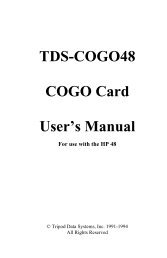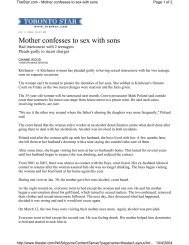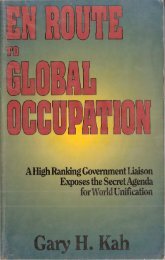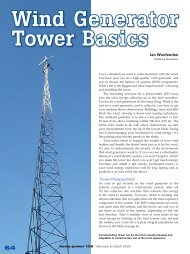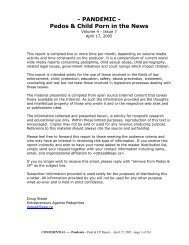G. Edward Griffin - The Fearful Master - PDF Archive
G. Edward Griffin - The Fearful Master - PDF Archive
G. Edward Griffin - The Fearful Master - PDF Archive
Create successful ePaper yourself
Turn your PDF publications into a flip-book with our unique Google optimized e-Paper software.
would be pointless if not translated properly to the political advantage of<br />
peace. But what happened was just the contrary. 6<br />
<strong>The</strong>re was early evidence that the North Korean forces were being trained and equipped<br />
by the Soviets and, after the Inchon landing, that the Chinese Communists were providing<br />
actual combat troops by the thousands. 7 Lt. General Samuel E. Anderson, commander of<br />
the Fifth Air Force, revealed that entire Soviet Air Force units fought in the Korean War for<br />
over two and a half years "to gain combat experience for the pilots." All in all, some 425<br />
Migs were being flown by Russian pilots. 8 <strong>The</strong> Soviets never even tried to conceal their<br />
part in the war. When United States Ambassador Lodge complained to the General<br />
Assembly's political committee that "Soviet planning instigated the original aggression,<br />
which was subsequently maintained by Soviet training and equipment," Vyshinsky, the<br />
Soviet delegate, calmly admitted the substance of the charge and replied, "Mr. Lodge is<br />
pushing at an open door." 9<br />
In spite of all this, the United States Government refused to allow General MacArthur to<br />
pursue the enemy across the Yalu River or even to bomb the bridges over which the<br />
Chinese Communists transported their troops and supplies. <strong>The</strong> official reason given was<br />
to prevent a war between the United States and Red China! <strong>The</strong> real reason, since we<br />
were already in a war with Red China, was simply that the United Nations did not want us<br />
to obtain a victory in Korea, and we had, by this time, agreed to go along with whatever<br />
the UN wanted.<br />
<strong>The</strong> typical view of so many of our UN allies was expressed in <strong>The</strong> Fabian Essays,<br />
published in London in 1952, with a preface by Prime Minister Clement Attlee. On page 31<br />
the author, R. H. Crossman, says: "A victory for either side [in the cold war] would be<br />
defeat for socialism. We are members of the Atlantic Alliance (NATO); but this does not<br />
mean that we are enemies of every Communist revolution. We are opposed to Russian<br />
expansion, but also to an American victory." 10<br />
In 1950, when Congress appropriated rather substantial sums of money to carry on the<br />
Korean War, and it looked as though we just might start thinking in terms of pressing for a<br />
victory, Prime Minister Attlee rushed to the United States to confer with President Truman.<br />
His mission was aptly described by the U.S. News and World Report which stated:<br />
<strong>The</strong> British Government continues to maintain direct diplomatic relations<br />
with the Chinese Communists . . . even though Chinese armies were<br />
killing British youths. . . . To Mr. Attlee, China's Mao Tse-tung still is an<br />
official friend. . . . He does big business with the British through Hong<br />
Kong. British businessmen are accepted in China. . . . <strong>The</strong> British want<br />
to get rid of Chiang and turn Formosa over to the Communists. <strong>The</strong>y<br />
oppose any move inside China that might embarrass the Communist<br />
regime. . . . Mr. Attlee still hopes for a deal covering Asia, while keeping<br />
up the appearance of a fight in Korea. 11<br />
Mr. Attlee was needlessly alarmed, for on November 16, 1950, President Truman<br />
announced: "Speaking for the U.S. Government and people, I can give assurances that<br />
we support and are acting within the limits of the UN policy in Korea and that we have<br />
never at any time entertained any intention to carry hostilities into China." 12<br />
When the Chinese crossed the Yalu, General MacArthur instantly ordered the bridges--six<br />
of them--destroyed by our Air Force. Within hours his orders were countermanded from


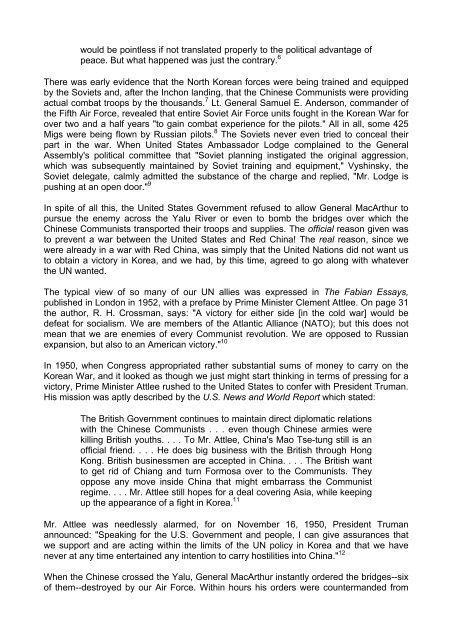
![Robert T McQuaid [rtmq@stn.net] Sent: Friday, October 29, 2004 12 ...](https://img.yumpu.com/51070071/1/190x245/robert-t-mcquaid-rtmqstnnet-sent-friday-october-29-2004-12-.jpg?quality=85)

